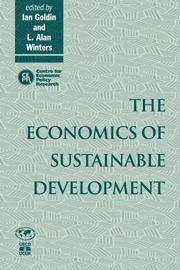Book contents
- Frontmatter
- Contents
- List of figures
- List of tables
- Preface
- Acknowledgements
- List of conference participants
- 1 Economic policies for sustainable development
- PART ONE GROWTH AND THE ENVIRONMENT
- PART TWO SUSTAINABILITY
- 4 What sustains economic development?
- Discussion
- 5 Optimal development and the idea of net national product
- Discussion
- 6 Sustainable growth and the Green Golden Rule
- Discussion
- PART THREE DOMESTIC POLICY
- PART FOUR INTERNATIONAL POLICY COORDINATION
- Index
Discussion
Published online by Cambridge University Press: 04 August 2010
- Frontmatter
- Contents
- List of figures
- List of tables
- Preface
- Acknowledgements
- List of conference participants
- 1 Economic policies for sustainable development
- PART ONE GROWTH AND THE ENVIRONMENT
- PART TWO SUSTAINABILITY
- 4 What sustains economic development?
- Discussion
- 5 Optimal development and the idea of net national product
- Discussion
- 6 Sustainable growth and the Green Golden Rule
- Discussion
- PART THREE DOMESTIC POLICY
- PART FOUR INTERNATIONAL POLICY COORDINATION
- Index
Summary
I have long been impressed by the power of Scott's ideas on growth, investment and employment, and equally impressed by the professional neglect towards them. In my view, Scott is right and the profession is wrong. Better put, Scott is useful, much more so than the profession, for the analysis of how economic policies affect growth. In this note, I shall justify my belief in Scott's brand of growth economics. In so doing, I shall discuss chapter 4 by focusing on Scott's fundamental growth equation (Scott, 1989: 171) on the payoff of good policies in terms of higher growth in per capita output; and on the issues of ‘sustainability’ that are central to any discussion of this topic.
Scott versus the profession
For the purpose of this discussion, the ‘profession’ is represented by three propositions:
Proposition 1
It is possible to increase output permanently without changing inputs.
Proposition 2
In a stationary economy (one with constant output per worker) the rate of output growth is not affected by the investment ratio.
Proposition 3
Proposition 2 is false, because investment in human capital affects the rate of technical progress.
Propositions 1 and 2 stand for a neoclassical growth theory, where technical progress is costless and steady growth possible as long as such progress comes in the form of ‘labour augmentation’. Proposition 3 stands for the new growth theory of Romer (1986) and Lucas (1988), that distinguishes sharply between material investment and investment in human capital.
- Type
- Chapter
- Information
- The Economics of Sustainable Development , pp. 106 - 110Publisher: Cambridge University PressPrint publication year: 1995



